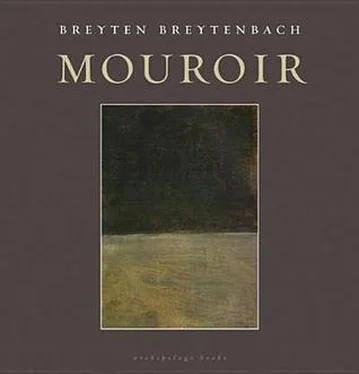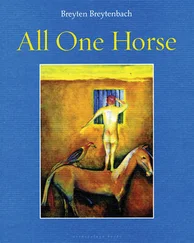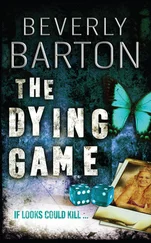The prisoners of war have new clothes. Lightweight suits. But their faces bear the tracks of neglect. That one with the yellow visage covered by wrinkles and stubble is a famous philosopher. Except (or therefore) that he is also an alcoholic, he says with tears like glad tidings over his cheeks.
Here my wife lived. I roam through the rooms full of accumulated rubbish, from the one room to the next, down stairs and up steps. The floors are freshly laid, the walls strong. Those window sashes she had painted blue so that they may seem like framed entrances to heaven. And this, this unfinished tapestry, she embroidered. Look, it is the repetition of our faces until the mouths together become one black orifice. Far, very far away, in the direction of all our seasons from which we came, on the last crest of the unfolding mountain chain, a wild horse stands silent in the wind. Too far off to be discerned with the naked eye.
But in the snow where we have to work along the other flank of the city’s outgrowth there are queer humps under the white matter. We walk with difficulty. We stumble over things. And with the unearthing we see that these are the carcasses of horses, infinite in the distance. How deep down do the dead go? How high? In how many layers? The cadavers are transparent and smooth with the colour of glass. Where blood has not yet coagulated the scratched open surface is slippery. Nothing can freeze here. Although everything is whitened by snow it is not at all cold.
In the white landscape are small groups of brown children. Each little group must imitate the song of a different bird. Life must be tempted back to earth . New patterns must define the emptiness. The band who must call up the ducks, stiff upright in the snow, make quick quack sounds. They also have fastened to strings wooden ducks shinily painted and varnished. Like the decoys which hunters of yore deployed in the marshes.
We are the war prisoners. We are the task force. Our duty it is to lay a path of green grass over the snow. So slow, such an infinite time it takes to create the dotted patterns of all the days of our lives. But we know that we have to complete it, green and with a spongy give under the feet, and that we shall go to freedom only along that way. Freedom. Freedom will lie waiting at the end destination of the road we are building and we shall reach it on a Tuesday. And the horse — will the horse still be there?
Shadows Break through the Mind
In case there’s still any doubt in your mind, nothing
short of castration (which arrests hair loss straight away,
but does have other setbacks) can bring back what
nature has taken away.
In all probability it started that time, long hence (although perhaps earlier too) when he strained uphill against the mountain wind. Escorted by two guardians of the morals in camouflage, one at each elbow. They were on their way with him to a place of safekeeping (but that’s neither here nor there). And on top of the knob of the incline, behind their backs a promenade along a fretful sea, a rickety house throned. When out of breath but full of wind they swerved left there, here the road runs parallel to the building, he became aware of excited life-signs behind the cloud-mirroring panes of the second storey. This old house is an asylum for the catatonic retarded. Behind one glass panel was the face, a blur as pale as a bat who never sees the sun, of a female with long black hair and oriental cheekbones; and the mouth of the face was opened wide in an outcry, stretched around an exclamation, suffocating, in order to swallow a shout, to force it down. In the next window he saw from the corner of his eye a stocky Black male gesticulating. There was spittle on the Black’s chin. Wind crumples sounds. Through the glass, behind the wind, it is as if they were jeering at him. “ Ou haas! Ou haas! ” (Old rabbit! Old rabbit!) That’s the way it sounded. Suddenly all of this, the juxtaposition of place and dawn and emotions, suddenly it was all extremely funny and touching and exhilarating. He took off his hat and chucked it in the air so that it took height like a slovenly seagull, his hair exploded in the wind. He is an angel. Tears of exuberance made his cheeks shiny and wet. Lightheadedness took hold of him and he had to give way. He had to make a false step. The urgent realization of the immediate. Now and here for ever, always. (“Easy, easy now my old one”, the one conductor exhorted, tightening the grip on his elbow.) But the world is made to stand on its head. Come what may.
Mouse Minnaar one morning took up position in front of the mirror and combed his hair (although perhaps earlier too). He saw that after pulling the comb through his hair-do a tuft remained stuck to the teeth. Never before, as far as he can remember, did he lose as many in only a few movements of the arm. With his hand he smoothed back his quiff from the forehead and to his utmost dismay noticed how much the paler patches above the temples had gained on the hairline, how unexpectedly bat-like his scalp has become. Kindest God. Like ringworm. No doubt any more. (How one misses the doubt once it has disappeared.) He is getting to be big-faced, to lose his finishing touches, to grow past his hair. Une légère calvitie ? No, a wasteland. It must be because of the worries, he thought. But, for pity’s sake, I have no more worries. I am safe. Is it the result then of melancholy? Something I must be doing wrong. That something. To have cares is to live inside and outside, to deflect life into reflection so that it is no longer open-minded. To make of life a stick. To stroke the self. Then there is no more life. I must think on nothing. I must find a focal point that I can burn white with undiluted attention. I must fondle the nothing. . And from that instant Mouse Minnaar watched his mirror every day: and started worrying so excessively about his diminishing head of hair that quite soon he became completely bald.
They drive down the deserted highway, the powerful engine of the Silver Phantom humming, headlights spewing the darkness, probing ahead, illuminating just the immediate ribbon of dusty road, eliminating any sense of the reality of the landscape around them: as if moving down an isthmus of security. Their backs to the North, always with their backs to the North, the North with its horrors and its violence, its uprooting, its desolation; the North always at their backs, the North ever just behind them, dragging their North with them wherever they go, extending it. They have long since become insensible to the dust filtering into the car, caking their nostrils, forming with the perspiration a sediment in the lines of their bodies. In the dark one doesn’t write the dust. It is hot. It is always hot. It has always been hot. The land is hot, the road is hot, the stars streaming down the face of the night must be hot — hot and white as headlights moving down highways from a North. Of course it is impossible to escape from the unseen.
Of course it is impossible to escape from the unseen, she thinks. Her thoughts have become jumbled and fragmented with the monotony of trying to escape down the road. We are all just hot and dusty thoughts, she thinks. She thinks: I am a thought thinking itself and not existing when the thinking lapses; Fagotin Fremdkörper steering the car, willing it away from the North, is a thought here in the dark next to me; and all the other itinerants gone ahead of us in their dust, and those who still may escape, may still follow us — they are thoughts too if I bother to think them. She moves over the seat, wants to stretch her limbs in the limited space, doesn’t try too hard because always there is the dust in eyelash and armpit and between suspender and stocking. She thinks: we must reach Laputa; ahead must lie Laputa; at the end of the road where night unravels Laputa must be. Safety? Asylum? Exile? Release? Then? No North? The North, the North is moving down in a rush behind the headlamps. She tries to think herself. But she thinks odds and ends of previous thoughts, the crust, flimsy words.
Читать дальше












